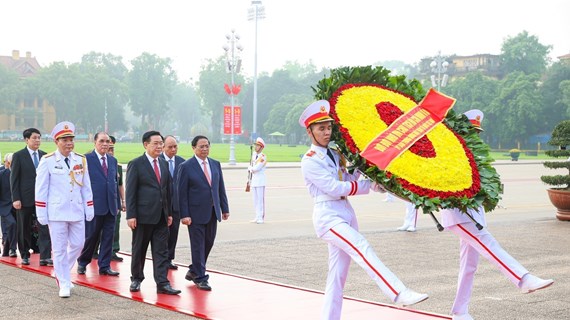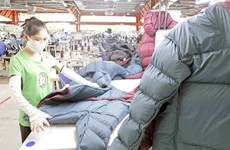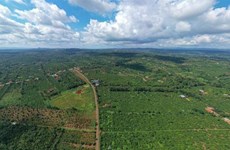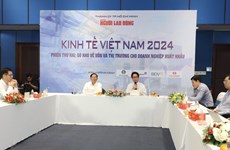Leisure real estate should be “open” to foreign investors: Expert
 A bird’s-eye view of An Thoi township in Phu Quoc Island. (Photo: VNA)
A bird’s-eye view of An Thoi township in Phu Quoc Island. (Photo: VNA)
Hanoi (VNA) – Breathtaking nature, beautiful long beaches and favourable climate in future special economic zones Da Nang, Van Don and Phu Quoc are setting the scene for leisure real estate sector to grow and lure more local and foreign investors to these areas.
Insiders have proposed policy-makers to not restrict or ban foreigners from pouring cash into leisure property projects to enable the sector to thrive further.
A recent survey of ten coastal resort cities and provinces across Vietnam found that they are home to 216 leisure real estate projects offering around 140,000 products, Vice Chairman of the Vietnam Association of Realtors (VARs) Nguyen Van Dinh told a seminar on potential of leisure real estate in future special economic zones post-COVID-19 held in Hanoi on June 9.
Of the total, 40,000 products have been put into operation while the remainders are under construction, Dinh said.
He highlighted the government’s strategy to get Vietnam’s tourism sector into the top three countries in Southeast Asia and the world’s top 50 in Travel and Tourism Competitiveness by 2025.
According to the strategy, Vietnam also aims to welcome at least 35 million international visitors and serve 120 domestic travellers by 2025 and 50 million foreign tourists and 160 million local holiday-makers by 2030.
Last year, the country received 18 million foreign tourists and 85 million domestic vacationers. It rose to the 63rd place from 67th in 2017 among countries around the world in Travel and Tourism Competitiveness.
It is an ambitious plan, Dinh said. To fulfill the goals, the country needs at least 300,000 rooms to serve the targeted number of foreign and domestic visitors in the next five years, as there are only close to 100,000 five-, four- and three-star rooms at present, he explained.
Vietnam needs to develop some more 300,000 units by 2025 and another 300,000 in the next five years, he continued, adding that it offers a huge opportunity for real estate developers.
Vice Chairman of the Vietnam National Real Estate Association (VNREA) Nguyen Manh Ha said many world-class resorts have been erected across the country, particularly in coastal localities, such as Da Nang City, Phu Quoc Island (Kien Giang Province), and Van Don (Quang Ninh Province).
He, however, noted that a large sum of foreign investment has been injected into housing projects in metropolises like Hanoi and Ho Chi Minh City but very little has gone into the leisure property sector.
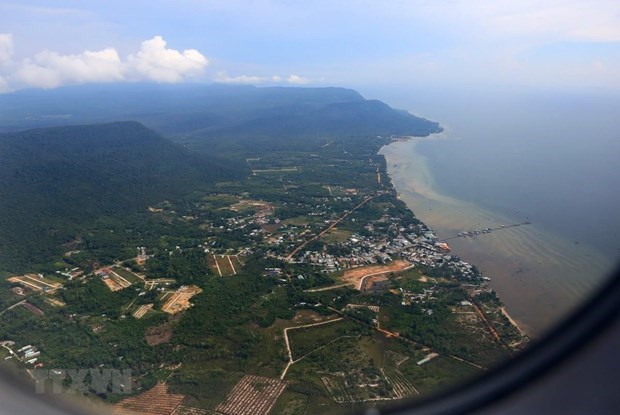 A corner of Phu Quoc Island. (Photo: VNA)
A corner of Phu Quoc Island. (Photo: VNA)
A number of localities found it confusing to handle registrations for ownership of leisure properties, restricting investment in this sector, he noted.
Dr Le Xuan Nghia, former Vice President of the National Financial Supervisory Commission, said foreign investors should not be kept away from the sector. The sector should be “open” to foreigners within a manageable scale.
To fuel the growth of leisure real estate in special economic zones, former director of the Institute for World Economics and Politics Vo Dai Luoc said developers should develop a diversity of services, not only beach and sight-seeing services, but also those associated with sports, Meeting Incentive Conference Event (MICE) tours and shopping, etc.
The diversity of tourism services will appeal to more visitors, Luoc said, urging faster development of multi-purpose leisure resort complexes which should comprise hotels, condotels, shophouses, parks, recreation and entertainment centres, and cruise terminals to meet various demands.
It is important to have a good planning for the leisure real estate to boom in Phu Quoc, Nha Trang, Van Don and Da Nang, he added./.





